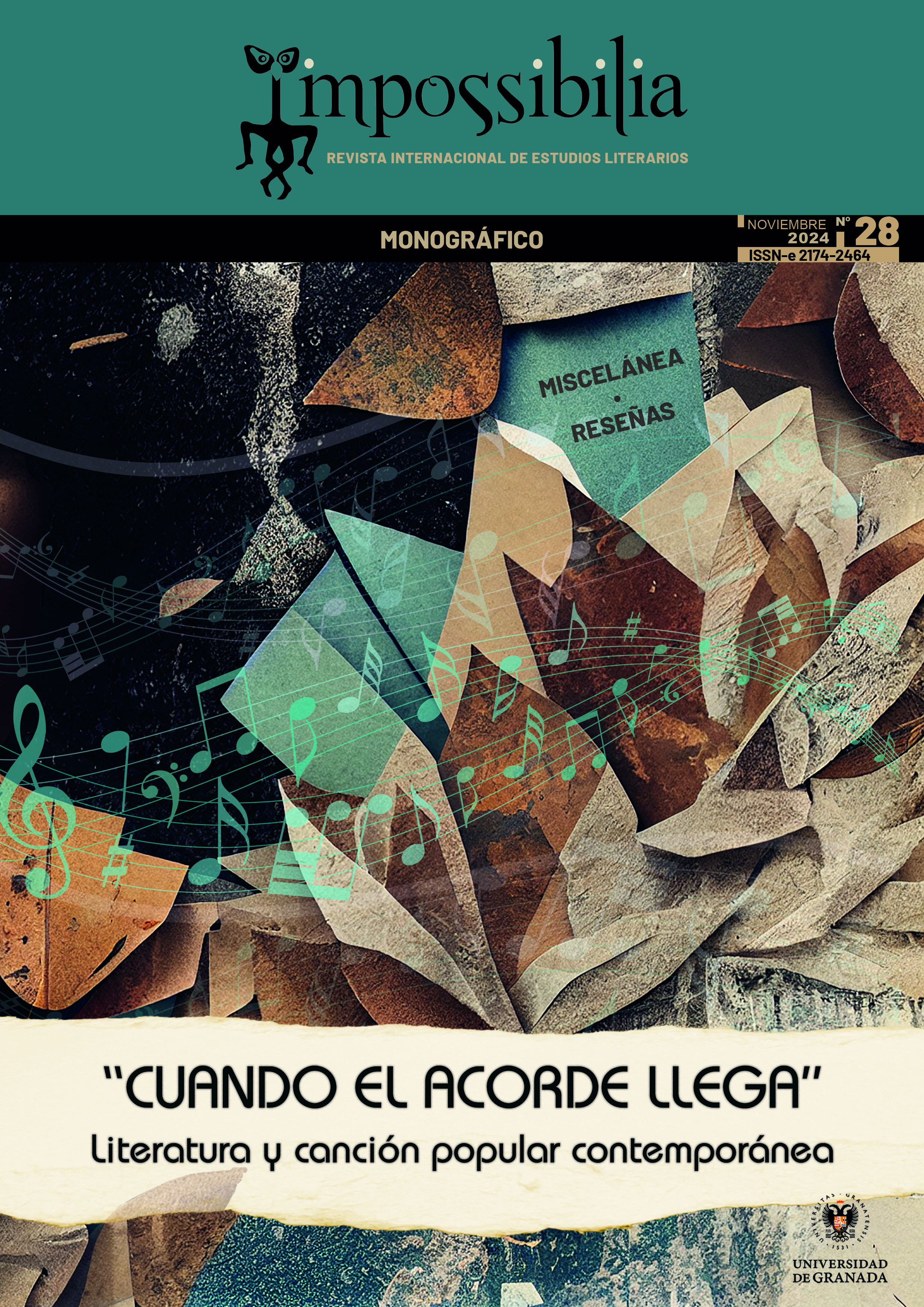Tinta y tiempo, Metasong in Jorge Drexler's Production
DOI:
https://doi.org/10.30827/impossibilia.282024.30710Keywords:
Metasong, Jorge Drexler, Spanish Singer-songwriter, Song, MetaliteratureAbstract
This paper aims to analyze the various manifestations of metasong (metacanción) in the work of the Uruguayan artist Jorge Drexler. To this end, I will explore some manifestations of metaliterature and focus on two case studies that delve into the emerging concept of metasong: De Miguel (2021) and Baños Saldaña and Sánchez Ungido (2023). We will propose our own definition of metacanción within the framework of aforementioned studies. Based on this definition, we will conduct a textual analysis of a selection of Jorge Drexler’s songs that reflect on the creative process in itself. A diachronic examination of Drexler's work will allow us not only to showcase his various perspectives on the act of songwriting, but also to consider his oeuvre in a broader sense, ultimately contributing to the relatively underexplored field of metacanción studies.
Downloads
References
BAÑOS SALDAÑA, José Ángel; y SÁNCHEZ UNGIDO, Guillermo [CELEHIS UNMdP] (25 de marzo de 2023). Mesa temática literatura española. Coordina: Facundo Giménez [Vídeo]. Disponible en: https://www.youtube.com/watch?v=Y2hoRv5cYm0&t=1316s
CERVANTES, Xavier (6 de mayo de 2022). ‘Cantautor’ es una palabra que no me gusta: suena como 'choripán' (entrevista a Jorge Drexler). Ara [en línea]. Disponible en https://es.ara.cat/cultura/musica/cantautor-palabra-no-gusta-suena-choripan_128_436
html#:~:text=%C2%A1Y%20me%20encanta!,chorip%C3%A1n%2C%20como%20gomaespuma.
DREXLER, Jorge (1996). “Dos colores: blanco y negro” [canción] en Vaivén.
DREXLER, Jorge (1997). “Milonga paraguaya” [canción] en Llueve.
DREXLER, Jorge (2010). “Que el soneto nos tome por sorpresa” [canción]
DREXLER, Jorge (2010). “Las transeúntes” [canción] en Amar la trama.
DREXLER, Jorge (2014). “La noche no es una ciencia exacta” [canción] en Bailar en la cueva.
DREXLER, Jorge (2017). “Abracadabras” y “Quimera” [canciones] en Salvavidas de hielo.
DREXLER, Jorge (2022). “Tinta y tiempo” [canción] en Tinta y tiempo.
FERRARI, Marta (2001). La coartada metapoética José Hierro, Ángel González, Guillermo Carnero. Mar del Plata: Martín.
MAÍZ, Claudio (2011). Las re(d)vistas latinoamericanas y las tramas culturales: Redes de difusión en el romanticismo y el modernismo. Cuadernos del CILHA, 14, 75-91. Disponible en https://revistas.uncu.edu.ar/ojs3/index.php/cilha/article/view/4166
MIGUEL MARTÍNEZ, Emilio de (2021). Metacanción en la canción de autor en español. En NOGUEROL JIMÉNEZ, Francisca; y SAN JOSÉ LERA, Javier Francisco. Entre versos y notas: canción de autor en español (41-92). Salamanca: Universidad de Salamanca.
OTHEGUY, Martín (17 de febrero de 2011). Aguafuertes montevideanas. Entrevista con Jorge Drexler. Montevideo Portal. Disponible en https://www.montevideo.com.uy/Tiempo-libre/Entrevista-con-Drexler-uc131602
PELTZER, Federico (1994). Poesía sobre poesía (En la literatura argentina contemporánea). Buenos Aires: Botella al mar.
PÉREZ PAREJO, Ramón (2002). Metapoesía ficción: claves de una renovación poética (Generación de los 50- Novísimos). Madrid: Visor.
SÁNCHEZ, Leopoldo (1993). La poesía en el espejo del poema: la práctica metapoética en la poesía española del siglo XX. Oviedo: Universidad de Oviedo.
VEGA, Lope de (1968). La dama boba. La niña de Plata. Madrid: Espasa-Calpe.
Published
How to Cite
Issue
Section
License
Copyright (c) 2024 Impossibilia. Revista Internacional de Estudios Literarios

This work is licensed under a Creative Commons Attribution-NonCommercial-NoDerivatives 4.0 International License.

You are free to share, copy and redistribute the material in any medium or format under the following terms: You must give appropriate credit, you may not use the material for commercial purposes and No Derivatives. Commits to respecting third party intellectual property rights.
Reception and proccesing of papers has no costs for authors.
Author assumes responsibility for the ideas contained in the article.
Papers must be original and must not have been published before and at the moment they are submitted, papers should not be in the process of evaluation by any other electronic or printed media.
The authors are allowed and recommended to publish their published work through the internet. It could produced interesting exchanges and increase the published work citation. (See El efecto del acceso abierto).




















